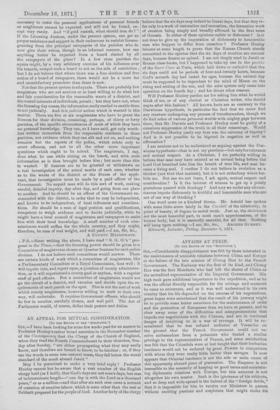AN APPEAL FOR MUTUAL CONSIDERATION.
[TO TUX EDITOR OF THE "SPROTITO."] have been looking for some few weeks past for an answer to Professor Huxley's rather broad assertion in the November number of the Contemporary that the Clergy of the Church of England, when they read the Fourth Commandment in their churches, Sun- day after Sunday, "are either propagating what they may easily know, and therefore are bound to know, to bo falsities ; or, if they we the words in some non-natural sense, they fall below the moral .standard of the much abused Jesuit."
May I be permitted to make a very brief reply ? Professor Huxley cannot but be aware that a vast number of the English clergy hold (as I hold), that God's days are not man's days, but eras of indeterminate length—" one day is with the Lord as a thousand years," or as a million—and that after six such eras came a seventh of cessation of creative labour, which is none other than the rest or 'Sabbath prepared for the people of God. Another body of the clergy
believe that the six days may indeed be literal days, but that they re- fer only to a work of restoration and recreation, the formative work of creation being simply and broadly affirmed in the first verse of Genesis. Is either of these opinions unfair or dishonest ? Is it not time to give up the imputation of dishonesty to honourable men who happen to differ from ourselves ? Professor Huxley labours at some length to prove that the Roman Church stands committed to the opinion that the six days of creation are natural days, because Suarez so opined. I am not deeply read in Jesuit or Roman class-books, but I happened to take up one in the parloir of the Sacre" Cfttir at Paris, which laid down ex cathedra that the six days could not be periods of four-and-twenty hours, because God's seventh day had lasted for ages, because the natural day must be supposed to be dependent to the mind of Moses on the rising and setting of the sun, and the solar system only came into operation on the fourth day ; and for divers other reasons.
Will Professor Huxley pardon me for asking him what ho would think of me, or of any clerical or Christian writer, who should argue after this fashion ? All known facts are so contrary to the Darwinian hypothesis, in particular the fact that we never find any creature undergoing any process of transformation, though we do find relics of various primeval worlds with mighty gaps between them, that Mr. Darwin and Professor Huxley must be guilty of a conscious suppression of the truth in all their reasonings. Would not Professor Huxley justly say that was the calumny of bigotry? And is it not possible to be bigoted in negation as well as affirmation ?
I am anxious not to be understood as arguing against the Dar- winian hypothesis—that is not my province—but onlyfor tolerance and mutual respect. As a Christian, I am perfectly willing to believe that man may have existed as an animal being before the Lord God breathed into him the breath of true life, and man be- came a living soul. I confess I do not believe in evolution as a thinker (not that that matters), but it is not orthodoxy which for- bids me. But can we not learn, I ask again, mutual respect and consideration? Is it the interest of science to get up a purely gratuitous quarrel with theology ? And may we under any circum- stances impute dishonesty to truthful and honourable men who are not of our way of thinking ?
One word more on a kindred theme. Mr. Arnold has spoken with some little scorn lately in the Cornitill of the inferiority, in point of beauty, of dogma to moral truth. Just so, the skeleton is not the most beautiful part, to most men's apprehensions, of the human body, but it is assuredly essential, for all that. Nothing










































 Previous page
Previous page